Some highlights this week:
- Charlottesville City Council will finalize a loan agreement governing $8.7 million in support for two nonprofit housing groups to purchase the Carlton Mobile Home Park
- The Greene County Planning Commission will have a public hearing for a rezoning to expand a mobile home park.
- Albemarle County will hold a public hearing on an application for $6.7 million in federal housing funds
- Fluvanna County will adopt a Comprehensive Plan that only updates three chapters, having put off a full rewrite while issues such as utility-scale solar zoning rules are worked out.
- In a bid to save the lives of people who suffer cardiac arrest in public, Louisa County Supervisors will be asked to join the PulsePoint network of public safety communication tools
- The Albemarle Board of Supervisors and the Charlottesville City Council will meet for the first time in a while to talk regional transit, revenue-sharing, and coordination with the University of Virginia
Thanks as always to the Piedmont Environmental Council for their sponsorship of this weekly look at what’s coming up in local and regional government. As part of my bid for transparency of how my work is funded, their support is limited solely to this research as well as the publication on their own website.
Monday, September 16, 2024
Charlottesville City Council to begin review of the FY26 budget
The Charlottesville City Council only has one item on the agenda for the work session scheduled for 4 p.m. in City Council Chambers. (agenda)
“The budget development process begins in the fall and provides the Council and the public the opportunity to review and decide the level of services that will be provided to the citizens,” reads the staff report.
There are no advanced materials so I’ll provide some resources. The best place to start is the city’s budget development website which has links to the current document as well as archived documents. The archive goes back to FY2007 when the adopted total budget was $120,145,206.
“The City’s non-property tax base is not growing enough to fulfill service needs and requirements, and that a greater and greater reliance on the real estate property tax to support city programs is needed,” wrote former City Manager Gary O’Connell in his budget summary for that year.
In that year, Council agreed to a six cent reduction in the real property tax rate from $1.05 per $100 of assessed value to $0.99 per $100. That was the fourth rate reduction in four years, and would be followed by a further four cent reduction in FY2008.
Much has happened since that time and Council has been increasing the real property tax rate in recent years even as assessments continue to rise.
In April, City Council adopted a budget for FY2025 that included a two-cent increase from $0.96 to $0.98, as well as an increase in the meals tax, an increase in the lodging tax, and an increase in the personal property tax. (FY25 budget explorer) (FY25 budget as a .PDF)

Between FY2007 and FY2025, the total budget in Charlottesville has more than doubled.
“It is no small feat to deliver a balanced local government budget, and rarely is it simple when it is accompanied by the delivery of multiple complex, critical priorities,” writes City Manager Sam Sanders in the introduction to the FY2025 budget. “The adopted General Fund revenue and expenditure estimates both total $251,948,630 which represents a 10.29 percent increase from the FY2024 Budget.”
Council to finalize funding agreement for Carlton Mobile Home Park purchase
The Council’s regular meeting begins at 6:30 p.m. One tip for anyone new to these meetings is that any changes Council makes to the meeting will be announced at 4 p.m. before they adopt the final agenda. (meeting overview)
In these reports, I seek to draw attention to the pass-through of federal and state funds into local government either for the locality’s use or for a non-profit. In Charlottesville, that means listing what’s on the consent agenda. This is a list of items Council expects will pass without controversy, but sometimes these are added to the regular agenda.
- There is second reading of a pass-through grant of $76,840 from the U.S. Department of Energy’s Energy Efficiency and Conservation Block Grant program. This was created in the Infrastructure Investment and Jobs Act of 2021. This funding will be passed through to the Local Energy Alliance Program. This funding will allow for 160 in-depth residential energy audits to be conducted. (staff report)
- Another $250,000 will pass through the City of Charlottesville to the Tonsler League run by Dr. Wes Bellamy, a former City Councilor and current chair of the Charlottesville Redevelopment and Housing Authority. This $250,000 comes from an amendment to the FY25 budget for the Commonwealth of Virginia secured by Delegate Katrina Callsen. The source is the Virginia Department of Social Services. The money will be released to the Tonsler League according to terms and conditions governed by the VDSS. This is the second of two readings. (staff report)
- There is also a second reading of $238,581 in funding for the Charlottesville Fire Department from the State Corporation Commission through their Fire Programs Aim to Locality funding mechanism that’s paid for through levies against the insurance industry. (staff report)
- There is second reading of a resolution to amend for the seventh time a grant between the City of Charlottesville and the Charlottesville Redevelopment and Housing Authority for the supplemental rental assistance program. (staff report)
- There is first of two readings to appropriate a $65,000 insurance claim related to a July 2022 crash in which a runaway school bus took the city’s fueling station at 1505 Avon Street out of service. This is the second of two payments. Planning was already underway for a replacement at the time of the collision. (staff report)
- There is first of two readings to appropriate $257,024 from the Virginia Department of Criminal Justice Services through the Victim Witness Program Grant that will go to the Commonwealth’s Attorney’s Office. (staff report)
- There is the first of two readings to appropriate $500,000 from the Virginia Department of Historic Resources to the Jefferson School African American Heritage Center for their Center for Local Knowledge. (staff report)
There’s one other item on the consent agenda I want to break out a little further. I’ve twice now reported on the $470,805 in funding from the Virginia Department of Housing and Community Development from their Virginia Homeless Solutions Program. The second time was included in a story I wrote this past week on City Manager Sam Sanders’ update on developing a city-wide strategy to assist those in need.
This is up for second reading and the staff report does not include a financial breakdown. But thanks to a prompt from a reader I asked for more details which I bring you now.
- Coordinated Entry: $50,000 – The Blue Ridge Area Coalition for the Homeless (BRACH) distributes these funds to The Haven
- Targeted Prevention: $126,002 – BRACH distributes these funds to The Haven
- Emergency Shelter: $86,590 – BRACH distributes these funds to PACEM
- Rapid Rehousing: $120,286 – BRACH distributes these funds to The Haven.
- Continuum of Care Planning: $34,000 – BRACH utilizes these funds for coordinating the CoC.
- Homelessness Management Information System: $23,809 – BRACH uses this to manage HMIS. BRACH uses these funds to pay for the users at each of the participating organizations including The Haven and PACEM.
- Administration: $25,959 – BRACH splits this between, BRACH, The Haven, and PACEM.
There is a gap of $4,159 which will go to Rapid Rehousing, according to the city’s grants manager.
In the previous stories I incorrectly reported that the City of Charlottesville received some of the funding, but all dollars are passed through to BRACH. Thanks to Afton Schneider, the city’s director of communications and public engagement, for helping to track down the numbers.
Corrections have been issued in all four locations where the incorrect information appeared.
There will be a public hearing on the reprogramming of $25,000 in Community Development Block Grants to improve a pathway in Jordan Park related to a recently constructed bridge.
“With this new proposed funding, Parks & Recreation will remove [a] narrow path and replace it with a new, accessible paved pathway that spans approximately 425 feet and that will provide an uninterrupted connection from the accessible curb ramp at the park’s Sixth Street entrance to the new trail bridge with new paved connections to the basketball court and both playgrounds,” reads the staff report.
One question: Where did the reprogrammed money come from? The staff report is not clear.
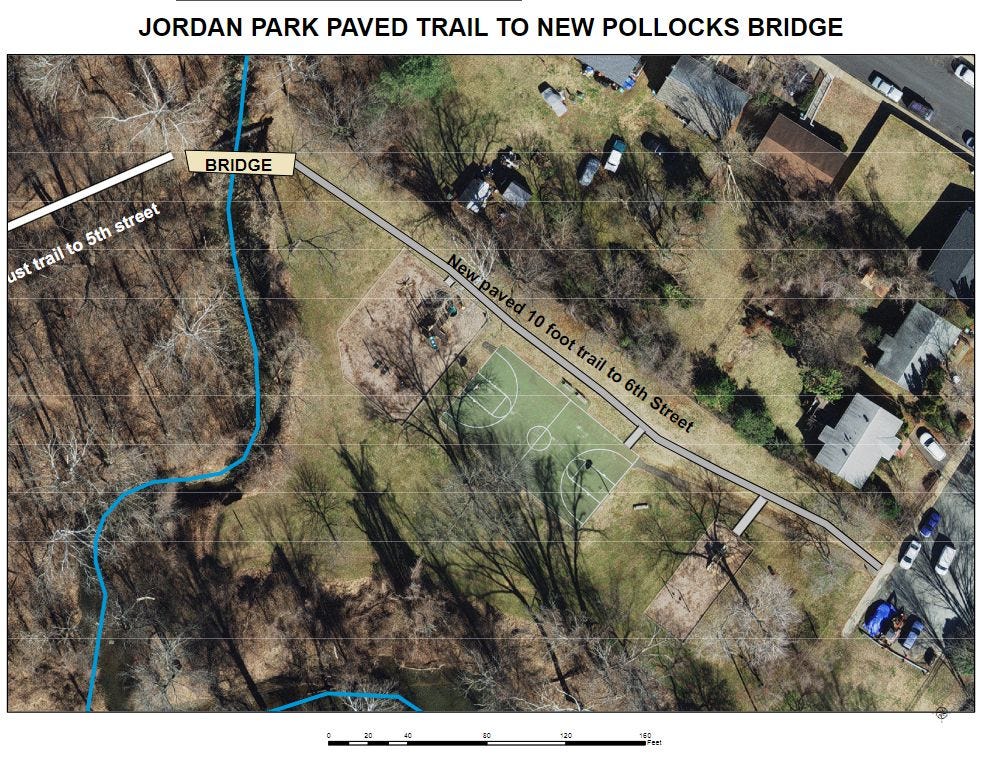
Next up, the City Council will hold the first of two readings on a new fee schedule for fire safety.
“Currently, the City Fire Marshal is authorized by Council to enforce and collect fees for the following permits: Dry Cleaning Plants, Explosives, Fireworks and Pyrotechnics, Hazardous Materials, Hot Work Operations, Open Flames and Candles, Temporary Membrane Structures and Tents, Social Services License Inspection, Re-inspection Fee, Plans Review, Mobile Food Vendors, and Fire Code Variance/Modifications.”
Collection of fees was waived during the pandemic but the schedule is being considered as part of the budget development process for FY26. If enabled, the fees would go into effect on January 1, 2025.

Habitat for Humanity of Greater Charlottesville and the Piedmont Housing Alliance are purchasing the Carlton Mobile Home Park with up to $8.7 million in financial assistance from the City of Charlottesville over five years. Council agreed in principle to provide the funding in early August but will now be asked to vote on the details, and waive a second reading required by the Virginia Code.
The two non-profit organizations will create an entity called Habitat Carlton Alliance to develop the property and here is some of what can happen after a three-year moratorium on redeveloping the existing space. (staff report)
- There will be a minimum of 180 dwelling units
- At least five rental units will be reserved for households with incomes between zero and 30 percent of the area median income. That is five units, not five percent.
- At least five will be provided to households with incomes between 30 percent and 50 percent of AMI. Again, that’s five units, not five percent.
- Seventy percent of the 180 units will be reserved for rental or ownership for households with low and moderate incomes, though that level is not specified in the staff report. That’s 126 units, including the ten above.
- That leaves the potential of 56 market-rate units. Who will be the development partner? Will any potential profits generated benefit the greater project?
- The money will be considered a loan and interest will be forgiven if development is completed according to the terms.
- Construction will commence by December 31, 2029 and be completed by December 31, 2033.
- Market rate and affordable units will be spread throughout the whole property.
- The project’s budget will be publicly accessible to the City of Charlottesville.
The agreement states the number of units and a resident-guided planning process will begin.
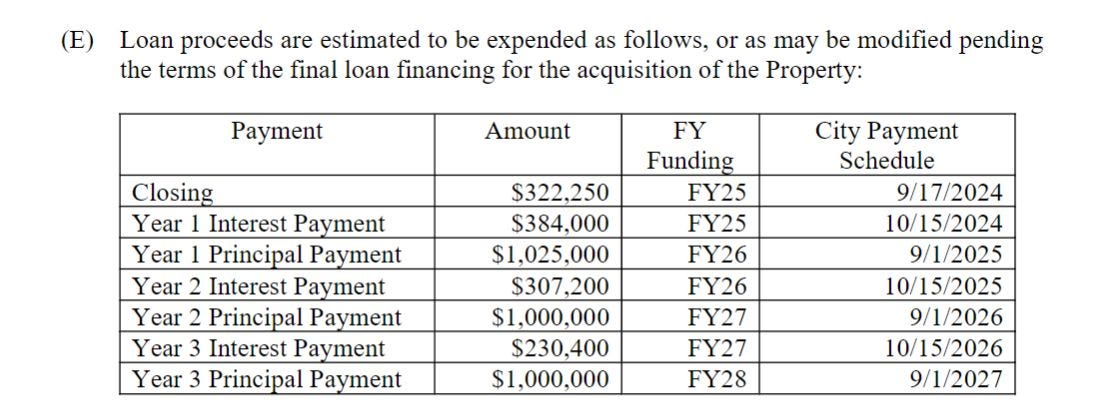
They expect to close on September 17, putting pressure on Council to accept the deal.
“Due to the timing of the closing on the property, staff recommends that the requirement for a second reading of this Ordinance be waived pursuant to a four-fifths vote,” reads the staff report.
Other resources:
Finally on the agenda, there will be a confidential settlement agreement. What could this be? The staff report tells us nothing, which invites me to invite you to speculate. Leave a comment or drop me a line.
Louisa County to joining PulsePoint Fire/EMS system
The seven member Board of Supervisors in Louisa County meets at 5 p.m. for a closed session in the Louisa County Public Meeting Room. The open session begins at 6 p.m. and this is a fairly light agenda. (meeting overview)
The consent agenda has a few items of note.
- Supervisors will recognize the years of service Beth N. Richardson spent in the General Registrar’s office (learn more)
- There is a resolution to authorize additional money to hire additional teachers at Louisa County Middle School. Specifically, $109.258 to hire two teachers for higher than expected enrollment. (resolution)
- There is a resolution to approve and award a $29.5000 contract to New River Engineers to conduct a survey related to the publicly-owned Louisa County Airport. Specifically this is to “obtain a confident mapping of the Louisa County Airport’s property limits” according to the request for proposals. (resolution)
There will be presentations from the Virginia Department of Transportation, from Region Ten, and from the Louisa County Chamber of Commerce. These aren’t available in advance.
Under new business, there will be two resolutions related to the Department of Fire*& EMS. The first is to implement the PulsePoint software that allows the public to track calls in progress.
The second is to allow for the application of state funding to purchase two drug box systems.
Both Albemarle and Charlottesville use PulsePoint applications to communicate public safety information in real-time. The goal is to save lives by getting help to people who have suffered a heart attack.
“When someone in a public place suffers a cardiac emergency, PulsePoint alerts trained individuals nearby, enabling them to begin CPR or apply an automated external defibrillator (AED) before professional responders arrive,” reads a request letter from the Louisa County Fire / EMS Management Oversight Group to the Board of Supervisors.
On August 15, the group voted to support moving forward with a grant from the Rappahannock Electric Cooperative and the Louisa County Rescue Squad to implement the system.
The request for a $21,000 Rescue Squad Assistance Fund Grant program would go to purchase two drug box systems for two fire stations. This will require a local match of $21,000.

In other meetings:
- The Albemarle Architectural Review Board will meet at 1 p.m. in Lane Auditorium of the county’s office building at 401 McIntire Road. On the agenda are reviews of a personal wireless facility at the site of the future UVA Credit Union headquarters as well as a four story hotel proposed for Pantops. (meeting info)
Tuesday, September 17, 2024
Albemarle Supervisors and Charlottesville Councilors to meet
There are eleven people elected to represent the two biggest localities in the Thomas Jefferson Planning District Commission. Meetings of the Albemarle Board of Supervisors and the Charlottesville City Council are rare and there has not been one for some years.
The joint meeting scheduled for Tuesday at 6 p.m. in Room 241 of the county’s administration building offers a chance for the two elected bodies to get briefings on several items while being in the same room.
The first discussion pertains to the revenue-sharing agreement that’s been in place since 1982 that has had the practical effect of Albemarle paying a portion of its real property tax revenue to Charlottesville in exchange for the city dropping further pursuit of annexation. Charlottesville slowly grew in the 20th century by taking over parts of Albemarle after successfully arguing before the Circuit Court that the city government could provide urban services more efficiently than Albemarle.
City Manager Sam Sanders has provided a written breakdown of how $15,715,740 was spent in fiscal year 2024. Actual dollar amounts are not included, and the document does not note that Albemarle County also contributes to many of the same shared services that are mentioned.
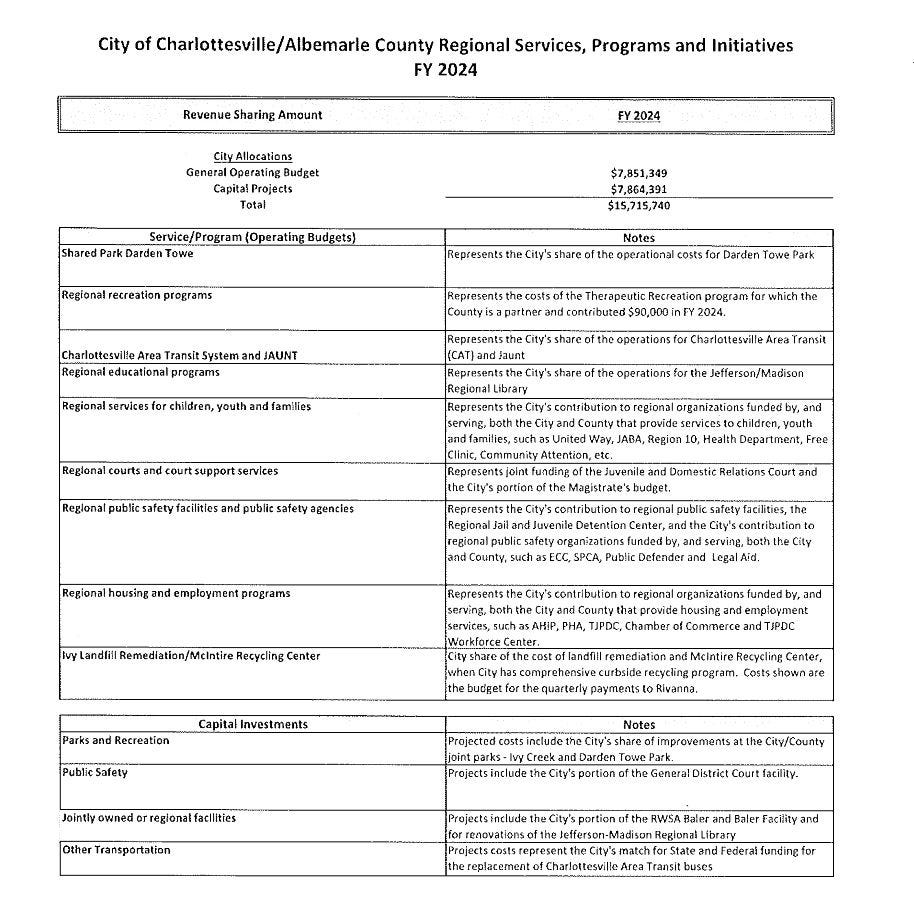
Next up is a document produced by both governments that list areas of partnership and collaboration. At nine pages, this is a larger document and there are some financial details but not for every item. (read the list)
After that, the University of Virginia Architect will give a presentation on the Land Use and Environmental Planning Committee. That is the closed-door group that replaced the Planning and Coordination Council. The PACC had been a public body that anyone could attend, but LUEPC is not open to the public.
Readers can at least view materials from the closed-door Land Use and Environmental Planning Committee. The most recent meeting is from July 19, 2024 and here are the presentations made available to the public if you click through.
- Minutes
- City of Charlottesville Transportation Planning Update Presentation
- Albemarle County Transportation Projects Presentation
- TJPDC Regional Transportation and Transit Presentation
- “The Value of Commute Club” white paper by Partick Clark, UVA Parking and Transportation
Regardless of my personal opinion on whether PACC should have been disbanded or not, my job now is to relay information about the broader picture of growth and development and how a community responds to the corresponding need for infrastructure.
The next two items are related to transit. Albemarle Deputy County Executive Ann Wall will give an update on efforts to create a Regional Transit Authority. There are also no advance materials for this from the government, but I’ve been tracking this story for years and in late August reported that the Regional Transit Partnership voted to recommend creation of an authority and that the head of Jaunt said that might be premature without further discussion. (Transit partnership votes to endorse transition to Regional Transit Authority, August 31, 2024)
The final item relates to the trip that a delegation of Albemarle and Charlottesville officials took to Champaign-Urbana, Illinois in May to investigate the hydrogen generation facility operated by the Mass Transit District.
“The aim was to showcase the benefits of this technology to our elected officials as Charlottesville looks to be emissions-free by 2050,” reads the first slide of the presentation.
I used a portion of the resources provided by my readers to travel along and am not listed as a trip participant on the second slide. And that’s how it should be, because as a member of the press, I am at these events to observe and report.
Here’s my story if you’ve not read it. You’ll note there’s an audio version in there, too. A second delegation is in the works and I want to go because I think there’s a lot to be learned from Champaign-Urbana.

In other meetings:
- The Albemarle County Department of Social Services Board will meet at 3:30 p.m. in the county’s office building at 1600 5th Street in Room 231. There are presentations on Elder Abuse Awareness and Adult Financial Exploitation. (meeting info)
- The Charlottesville Board of Architectural Review will meet at 5:30 p.m. in CitySpace. On the agenda is a certificate of appropriateness for a modified fence at 409 Park Street. (agenda)
Wednesday, September 18, 2024
Fluvanna Board of Supervisors to re-adopt Comprehensive Plan
The five members of the Fluvanna County Board of Supervisors will meet in the Circuit Courtroom of the Fluvanna Courts Building at 6 p.m. (full agenda)
After reports and the public comment period, there will be a presentation on the funding appropriation method used to calculate funding for Fluvanna County Public Schools.
“The County currently funds the school board appropriations based upon a total only,” reads the staff report. “Once the total only appropriation is set as part of the annual adopted budget resolution, the school board maintains control of expenditure classification within its Budget.”
Virginia code allows localities to fund their school systems based on categories. That gives a Board of Supervisors more control.
What prompted this discussion?
There are two action matters. One is an authorization to advertise an October 16, 2024 public hearing on an amendment to the dangerous dogs ordinance. The details can be seen in the staff report.
The second is related to the dates of the Board of Supervisors meeting in January 2025. (details here)
There are two public hearings.
The first is on readoption of the 2015 Comprehensive Plan which only makes changes to three chapters. They are Land Use and Community, Economic Development, and Historic Preservation. (learn more)
“An update of the Plan was started with the intent to have it complete by 2020,” reads the legislative history section of the staff report. “However, due to COVID and staff turnover, the Plan update was not completed.”
Staff indicate they will bring back a plan for approval in the future, but this adoption is to bring Fluvanna County into compliance.
This begs a question: Is Albemarle County in compliance with their plan also last adopted in 2015 without an update? I hope to have an update on where the next phase of the AC44 process stands in the next regular edition. For now, here’s a link to a story from early August.
In any case, a member of the Rural Preservation Advisory Group issued a minority report to that panel’s report to the Planning Commission that disputed some of the protections that were being suggested to slow development. (page 218)
This is one example of how the plan’s review was paused in Fluvanna.
“Out of the many months of review, community meetings, and shared concerns, it became apparent that the residents of Fluvanna County have a deep and abiding desire to maintain the rural character and charm that has long been a hallmark of life in the County,” reads the introduction to the 2024 update. “However, rather than promote a wholesale stop to development, it was equally obvious that it was with an eye toward balanced development and growth that the advisory groups moved forward.”
Moving forward, the population of Fluvanna County is expected to grow to 35,124 by 2050 according to projections from the Weldon Cooper Center at the University of Virginia. That’s up from 27,249 recorded in the 2020 Census.
The second public hearing is on increases and other changes to the fees developers and others pay to process planning and zoning applications. (learn more)
“Zoning and Subdivision fees have not been adjusted since 2018,” reads the staff report. “These changes would bring Fluvanna County in line with surrounding counties; amending the fees could potentially increase revenue [by around] $25,000.”

Albemarle Supervisors to reallocate funding including $100K for homeless shelter
The six members of the Albemarle Board of Supervisors meet at 1 p.m. in Lane Auditorium of the county’s office building at 401 McIntire Road. (agenda) (meeting info)
The first action item is an update on the Septic to Sewer program from Chief Human Services Officer Kaki Dimock. This program was set up in FY23 when Albemarle Supervisors appropriated $1 million to assist property owners on failing septic systems in the urban area with connections to public sewer. The Albemarle Housing Improvement Program worked as a partner.
Notices were sent out to 250 potential households and the staff report notes that while interest has been low, half of the money has been used.
“Since the return of the signed contract on January 10, 2023, County staff have processed four invoices for work completed totaling $313,702.13 for septic to sewer conversions for five households,” reads the staff report. “AHIP reports that there are an additional four households in the contract development phase; these conversions are estimated at an additional $186,297.87 for a total of $500,000 of the initial appropriation of $1,000,000.”
Due to what is described as low interest, staff is now recommending redistribution of the funding with $150,000 going to help three other households connect to public sewer. The rest is recommending as follows:
- $80,000 to continue housing navigation services provided by the Financial Opportunities Center for County residents
- $170,000 for the Albemarle County Emergency Relief Program providing funds to residents with an eviction or shut-off notice
- $100,000 to a homelessness service contingency account to support efforts to develop a low-barrier year-round shelter
Next, Supervisors will have a discussion on legislative priorities for the 2025 General Assembly. This is the second opportunity for the six locally elected officials to weigh in on what state elected officials should consider. Part of their request is for state funding for the Rivanna Futures project being pursued by Albemarle County. (2025 priorities)
“[The Intelligence and National Security Innovation Acceleration Campus] will be a center for agencies, and academic and private sector partners, focused on intelligence and national security collaboration and innovation on a future expansion of the existing Rivanna Station footprint, as well as new private and academic sector office and research and development spaces in close proximity,” reads that portion of the staff report.
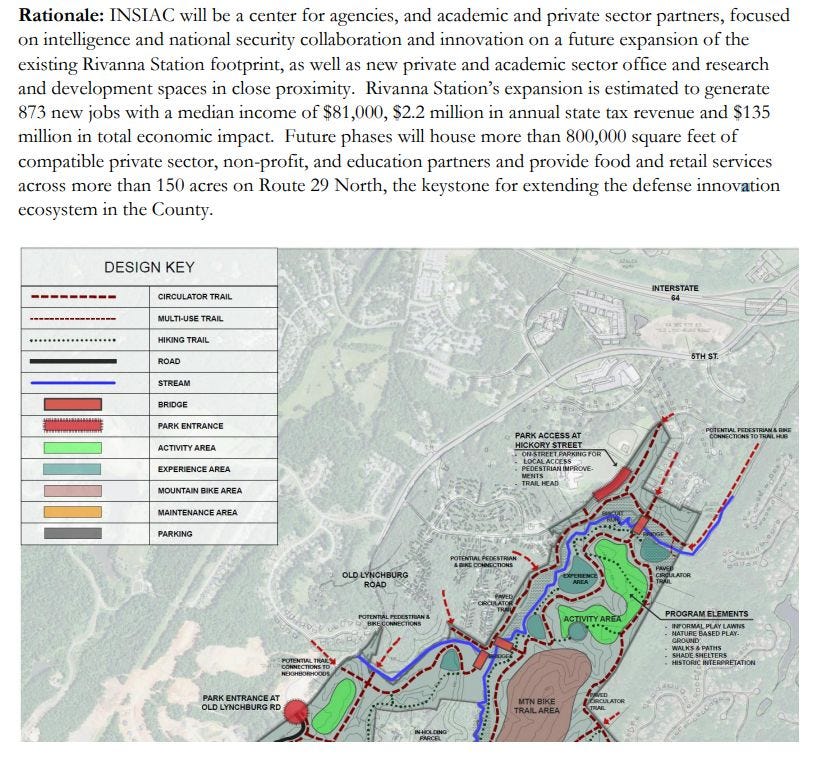
The evening session begins at 6 p.m. and has a couple of public hearings.
The first is for a public hearing to receive public input on a request for federal funding for Albemarle’s application through the Pathways to Removing Obstacles to Housing from the U.S. Department of Housing and Urban Development.
“Staff is proposing the County submit an application requesting $6.5 million,” reads the staff report.
That breaks down as:
- $5 million for creation of an revolving loan fund for the creation of affordable rental units that would go by the acronym ARHRLF.
- $1 million would go to the creation of a small landlord fund
- $435,000 would go to construction of an affordable multifamily rental housing development but the specific site is not identified in the staff report.
- $65,000 would go to support county staff in administering the grant over six years.
The second public hearing is for a special use permit for a landscape contractor to operated at 4842 Richmond Road. (staff report)
In other meetings:
- The Charlottesville Housing Advisory Committee will meet at noon. In the interest of time I’ll have a preview and summary of the August meeting in a newsletter before then. (meeting packet)
Thursday, September 19, 2024
Expansion of Ruckersville Mobile Home Community up for public hearing in Greene County
There are four public hearings scheduled for the Greene County Planning Commission which begins at 6 p.m. in the Greene County Administration Building in Stanardsville. (agenda)
The first is for a special use permit for a home business for auto restoration at 675 Matthew Mill Road. An existing permit has been granted for a previous business that made trophies. Recommendations in the staff report include limiting hours from 10 a.m to 4 p.m. (item packet)
The second is for a request to rezone a 15 acre parcel on Seminole Trail from Business General to Business Highway and High Intensity. The site is currently undeveloped. (item packet)
“The applicant seeks to change the zoning on the property to permit a wider variety of business uses on a property that is in an idea location,” reads the narrative for a project called the Ruckersville Business Center.
No specific use is listed but there are a series of results from traffic generation software for different kinds of uses. For instance, a 25,000 square foot light industrial building would generate an additional 36 vehicle trips a day. A strip retail plaza would generate 214.
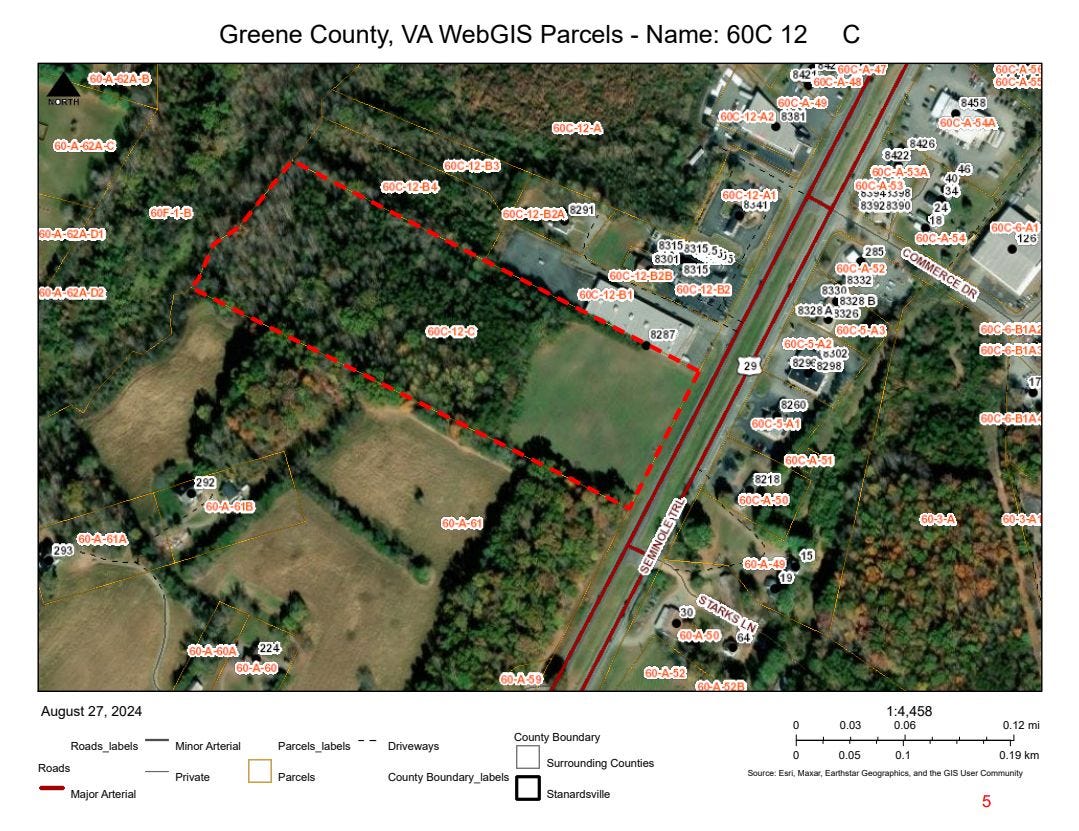
The third and fourth public hearings related to the same property. Ruckersville MHC LLC seeks a rezoning request and a special use permit for a portion of land on Shady Grove Road from Residential-1 to Residential-2. This would allow for the expansion of the Ruckersville Mobile Home Community. (item packet) (SUP item packet)
This property is currently home to a mobile home park community comprising 26 manufactured home lots,” reads the narrative from Shimp Engineering.
The current site is nonconforming to the zoning ordinance so the rezoning is needed to expand the total number of units on site to a maximum of 98 lots. The narrative argues this is consistent with the 2023 Comprehensive Plan, which was updated after direction from the General Assembly to allow for manufactured homes.
“The predominant housing type in Greene County is single family detached, comprising over 82.6% of the current housing stock, and the alternative housing types provided within this project will help to diversify the housing stock in Greene County making this project appealing to an array of County residents who wish to cut on their housing expenses while still enjoying the benefits of living in a detached unit,” the narrative continues.
Each lot would be a minimum of 5,200 square feet with a minimum distance of 30 feet between units. There would be two parking spaces per lot.

In other meetings:
- At 2 p.m. the City of Charlottesville will hold a site plan conference for 2117 Ivy Road, a project approved under the former zoning code. More on this item in a future edition of the newsletter. (learn more)
- The Nelson County Board of Supervisors will hold an all-day retreat but the calendar does not list where. At the end of the September 13 meeting, they adjourned to 10 a.m. on this day but didn’t specify where.
- The Charlottesville Parks and Recreation Advisory Committee will meet at 5:30 p.m. at 501 E. Main Street. Items on the agenda include an introduction to new staff, a presentation on the Carver Recreation Center, the department’s capital improvement requests for the FY2026 budget, and an update on the marketing of the rules on dogs in city parks. (learn more)
- The Charlottesville Human Rights Commission meets in CitySpace at 6:30 p.m. An agenda was not available at publication time. (learn more)
- Albemarle’s 5th and Avon Community Advisory Committee will meet at 7 p.m. in the 5th Street County Office Building in Room B. There’s a community meeting for the relocation of a personal wireless communications tower at the property on 5th Street now owned by the UVA Credit Union for their new headquarters. That is also on the agenda of the ARB on Monday! (meeting info)
This post was contributed by Sean Tubbs. Sean is a journalist working to build a new information and news outlet centered around Charlottesville and Virginia. In 2020, he launched a daily newscast and newsletter and also created a semi-regular podcast on the pandemic.
Support for Sean’s “Week Ahead” update comes from The Piedmont Environmental Council.
